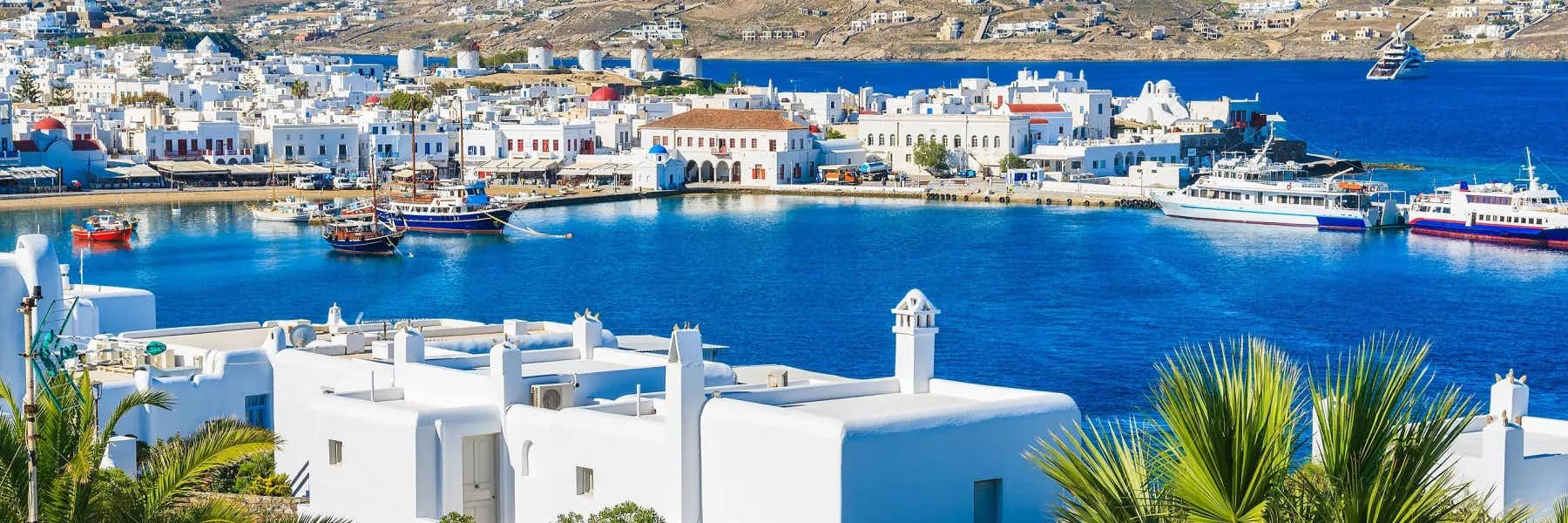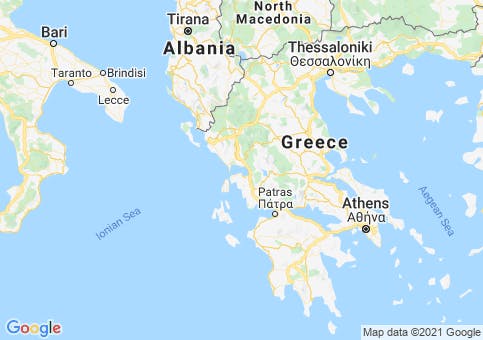Despite its relatively small size of 34 square miles, Mykonos commands a tremendous amount of attention when it comes to Greek tourism. Attracting over 500,000 visitors a year, it is recognized as one of the most famous islands in the world. Also known as the “Manhattan of the Aegean,” Mykonos offers you gorgeous beaches, world-class entertainment, stylish shopping, access to ancient history, and a wonderful opportunity for fun and adventure. From sunset drag shows to curated tours of ancient ruins, Mykonos has something interesting for everyone. Below we offer you a guide to Mykonos.
Mythology of Mykonos
According to ancient myth, Mykonos was the scene of a famous battle between the Giants (the children of Gaia, the earth goddess) and the Olympian gods. The hero Hercules lured the Giants from their hiding place and defeated them in battle on the island of Mykonos. The legend goes that some of the giant rock formations on Mykonos are petrified bodies of these mythological Giants.
Get Your Free Greece Report Today!
Get Your Free Greece Report Today!
Learn more about a slower pace of life in Greece and other countries in our free daily postcard e-letter. Simply enter your email address below and we'll also send you a FREE REPORT — Retire in Greece—Find Your Dream Retirement in This European Archipelago.

By submitting your email address, you will receive a free subscription to IL Postcards, Overseas Dream Home, The Untourist Daily and special offers from International Living and our affiliates. You can unsubscribe at any time, and we encourage you to read more about our Privacy Policy.
History of Mykonos
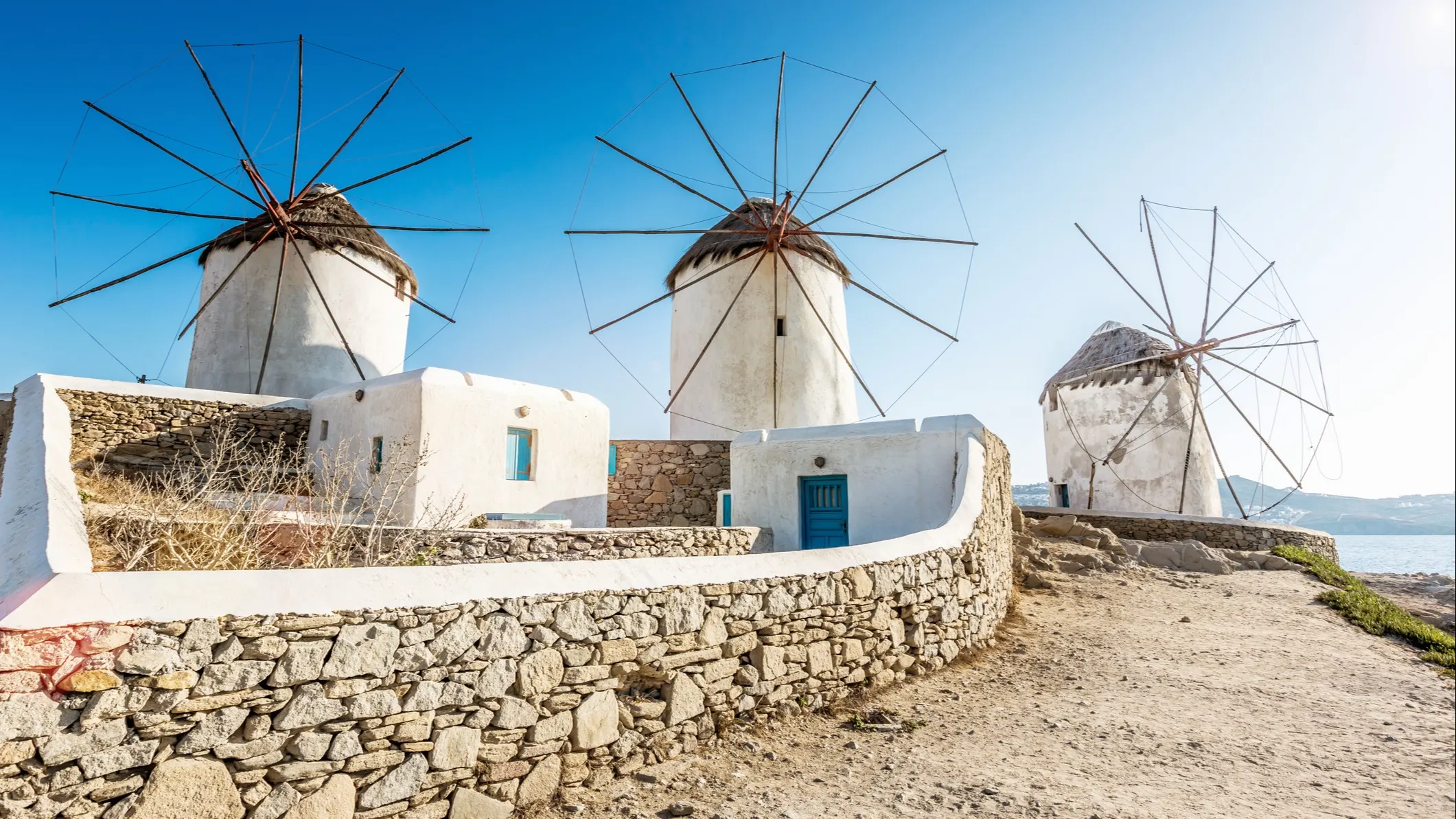
Because of its geographically favorable location, Mykonos has been an important stop for merchant ships throughout history. An unintended consequence of this trade route is that the diversity of visitors left the island inhabitants open-minded—a characteristic that still exists today.
The island has been under both Venetian and Ottoman rule, and Mykonos played an important role in the fight for Greek independence in the 1800s. The wealthy aristocrat Manto Mavrogenous went to Mykonos, the island of her origin, and directed all of her family’s fortune to support the Greek revolution. Fought all over Greece, the revolution raged on for years before it was ultimately successful, and in 1829 Greece won its independence.
The history of tourism in Mykonos started about 100 years later. In the 1920s, Mykonos began attracting visitors when archeologists and history buffs began using the island as a base to visit the sacred island of Delos. Located six nautical miles from Mykonos, Delos is the exclusive home to a massive archeological site. It offers no overnight accommodations so Mykonos effectively became its base camp.
Tourism turned more glamorous when former U.S. first lady Jackie Kennedy Onassis (Jackie O) visited the island with her husband, the wealthy businessman Aristotle Onassis in the 1960s. Next came Grace Kelly, Brigitte Bardot, and by the 1970s, the island had exploded as a destination for celebrities and the mega-wealthy.
Today you’ll find an entertaining cross-section of youthful party culture, celebrity glamor, a vibrant anything-goes gay scene, high-end shopping, and sophisticated dining as well as stunning beaches.
Where to Go in Mykonos
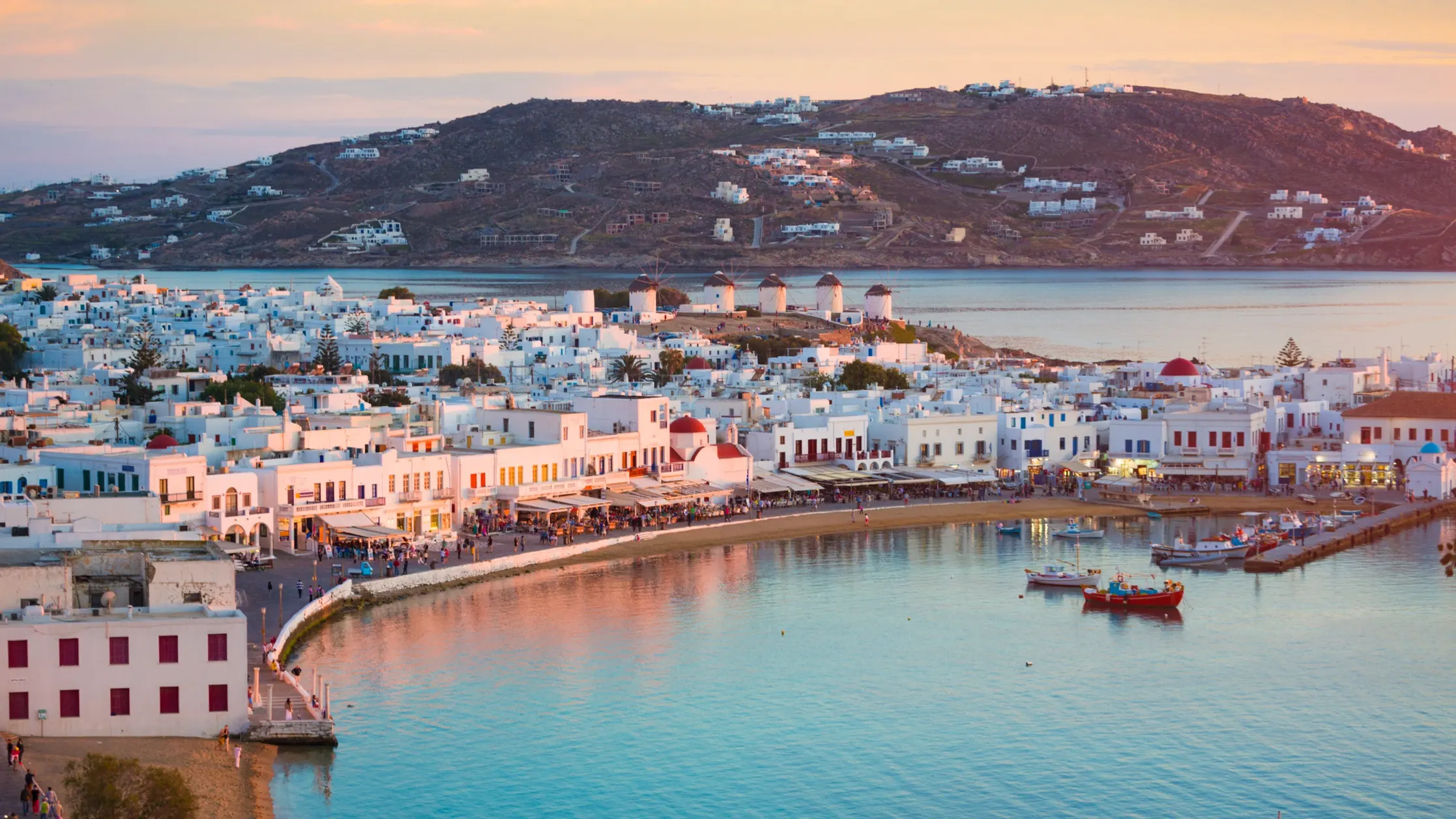
Mykonos consists of eight main areas that range from densely populated and urban to rural and largely uninhabited. The full-time population of the island is just over 10,000, but the headcount can swell to over 50,000 people a day during the high season. The beaches south of the island are more developed and popular than those in the north, mainly due to the strong wind conditions that make the northern coast less hospitable.
Mykonos has an international airport (airport code JMK) in the middle of the island and offers two ports: the New Port and the Old Port. For those sailing from the Old Port, the landing sits at the water’s edge of Mykonos Town. The New Port lies about 2.5 miles from Mykonos Town.
Mykonos Town
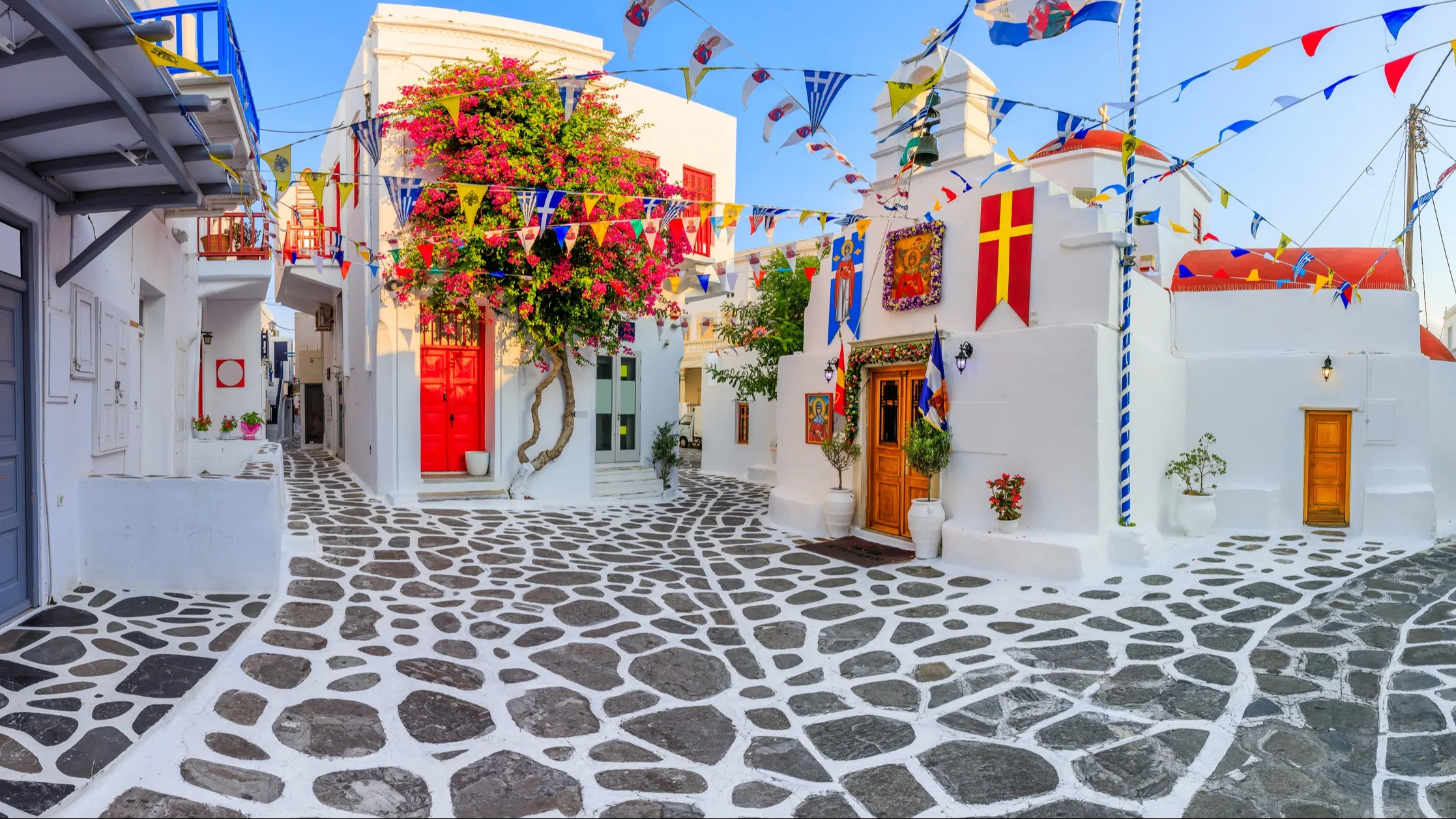
On the west coast, Mykonos Town (also called Hora) is where most of the island’s 10,000 full-time residents live. The majority of Mykonos Town is closed to cars allowing you to stroll leisurely down its winding cobbled alleys. The village is lively, with lots of restaurants, bars, cafes, art galleries, and retail shops. Here you can enjoy high-end shopping at Louis Vuitton and Gucci or boutique luxury stores like Sketch Boutique and Rousounelos Luxury Watches.
While in Mykonos Town, be sure to check out Little Venice, a series of alleys that sit right against the seaside, offering beautiful sunsets and a sparkling nightlife. Mykonos Town has several churches, including the stunning Panagia Paraportiani, one of the most photographed churches in the world. Another landmark is the famous windmills that sit above the harbor. Here you will also likely find Petros the Pelican, a Mykonos icon and friendly pelican who waddles between the windmills and Little Venice.
Ornos
A world away in terms of vibe, but only about two miles from Mykonos Town lies the area of Ornos, a beachfront known for being a family-friendly area with calm waters and lively but tamer parties. It’s a popular destination since it offers beautiful, well-organized beaches situated in easy proximity to Mykonos Town. The town has plenty of seaview restaurants as well as a supermarket, bakery, and street food options.
Platis Gialos
South of Ornos on the western side of the island, Platis Gialos is famous for its high-end resorts and hotels. The seafront features restaurants, cafes, and organized beach clubs offering umbrellas, sunbeds, and refreshments. Located between Ornos and Platis Gialos is Psarou Beach, one of the most expensive and exclusive beaches in Mykonos, where you can enjoy fine dining and yacht sightings.
Ano Mera
Located in the center of Mykonos, the town of Ano Mera is about 4 miles from Mykonos Town. This area offers a more traditional Greek experience with low-profile cafes, tavernas, and a picturesque town square. The Panagia Tourliani monastery and the Monastery Paleokastro are the main sightseeing opportunities of this area. If Mykonos Town is too crowded for your taste, Ano Mera offers a welcome respite.
Kalafatis
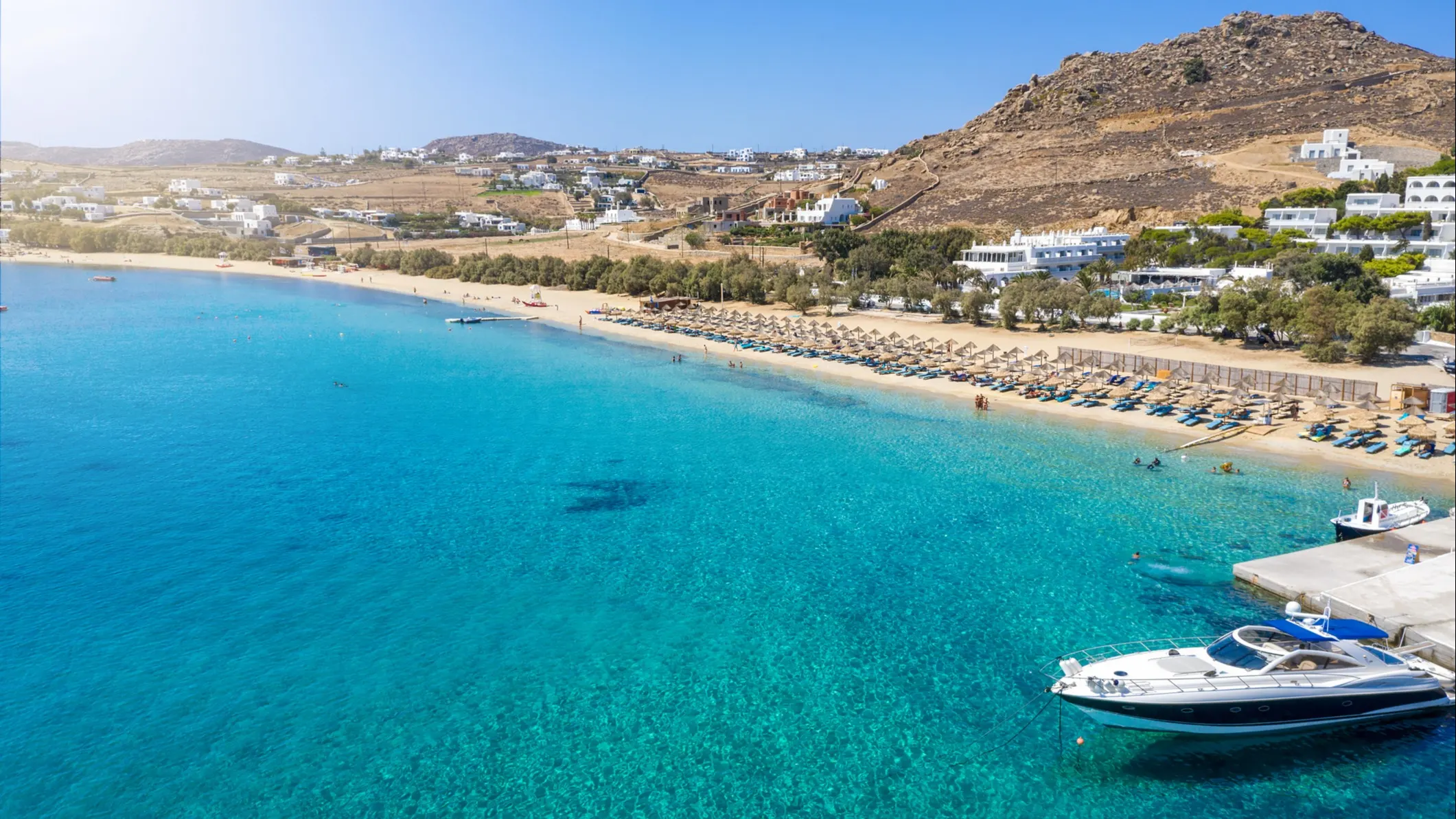
About seven miles to the east of Mykonos Town lies the secluded Kalafatis, an area offering a low-key vibe along with exclusive beach resorts. While Mykonos is known for being arid and dry, this part of the island can be lusher with green vegetation. The coastline of Kalafatis has a reputation for being windy, and Kalafatis Beach is a favorite among windsurfers.
Tourlos
If you take a ferry to Mykonos, chances are you will end up in Tourlos, the home of the New Port located on the north west coast of the island about 1.5 miles from Mykonos Town. This area features panoramic views, popular beaches, and the chance for celebrity sightings as it is a favorite destination among the jetset.
Agios Ioannis
If calm and uncrowded is what you seek, Agios Ioannis, the most western point of Mykonos, might be your place. The beaches of this area offer clear views of Delos and are generally less crowded than the areas of Platis Gialos and Ornos.
Faros Armenistis
In the northwest of Mykonos, you’ll find Faros Armenistis (also called Fanari), with its famous lighthouse overlooking the island of Tinos. The lighthouse was built after the British ship “Volta” sank off the northern coast of Mykonos in 1887 and served as a beacon for sailors for almost 100 years. These days it offers impressive views coupled with old-world charm.
Retire in Mykonos
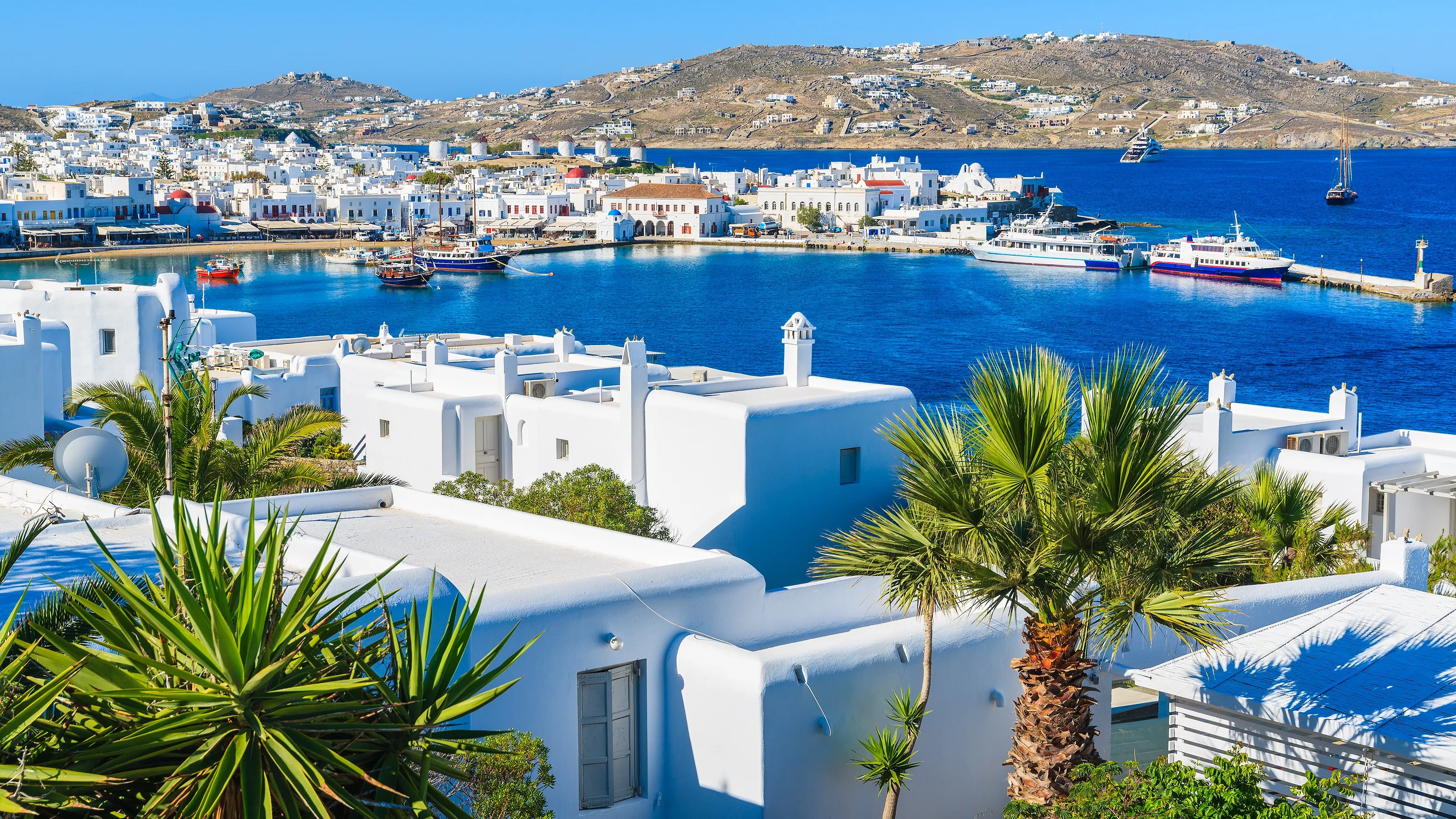
Like all Greek islands, Mykonos offers pros and cons as a retirement option.
Pros: During the high season of May to October, Mykonos is alive and vibrant. From superstar DJs to sophisticated art openings, this open-minded island attracts a spectrum of acts and entertainers. If you are a foodie, Mykonos has a huge variety of restaurants ranging from elegant to casual and from traditional Greek to Asian fusion. You have lots of dining and entertainment options in Mykonos during the summer season.
Cons: During the off season from November to Greek Easter (usually late April), the same stores, bars, restaurants, and cafes that make the island so lively during the summer shut down. Mykonos suffers from desolation as the island shifts into low gear for the winter. If you don’t mind the abrupt change, this might not be a problem, but for many, the Mykonos of their dreams is a lively island, and this isn’t the year-round reality.
Mykonos is also expensive, and from lodging to eating, you can expect to pay a premium for being on this high-profile, marquee island. A plate of octopus in Mykonos might cost $22 while you can go to neighboring island Tinos and spend $8 for the same dish.
Get Your Free Greece Report Today!
Get Your Free Greece Report Today!
Learn more about a slower pace of life in Greece and other countries in our free daily postcard e-letter. Simply enter your email address below and we'll also send you a FREE REPORT — Retire in Greece—Find Your Dream Retirement in This European Archipelago.

By submitting your email address, you will receive a free subscription to IL Postcards, Overseas Dream Home, The Untourist Daily and special offers from International Living and our affiliates. You can unsubscribe at any time, and we encourage you to read more about our Privacy Policy.
Lifestyle in Mykonos
Your lifestyle in Mykonos depends a lot on where you live, what you do, and when you are there. A year-round existence in Ano Mera, avoiding the high season tourist spots, will feel a lot different than a summer-focused stay based in Mykonos Town, taking full advantage of the rich entertainment and fine dining scenes. In Mykonos, your spectrum of options is wide, and your choices matter a lot. This is because living in Mykonos can be costly.
Cost of Living in Mykonos
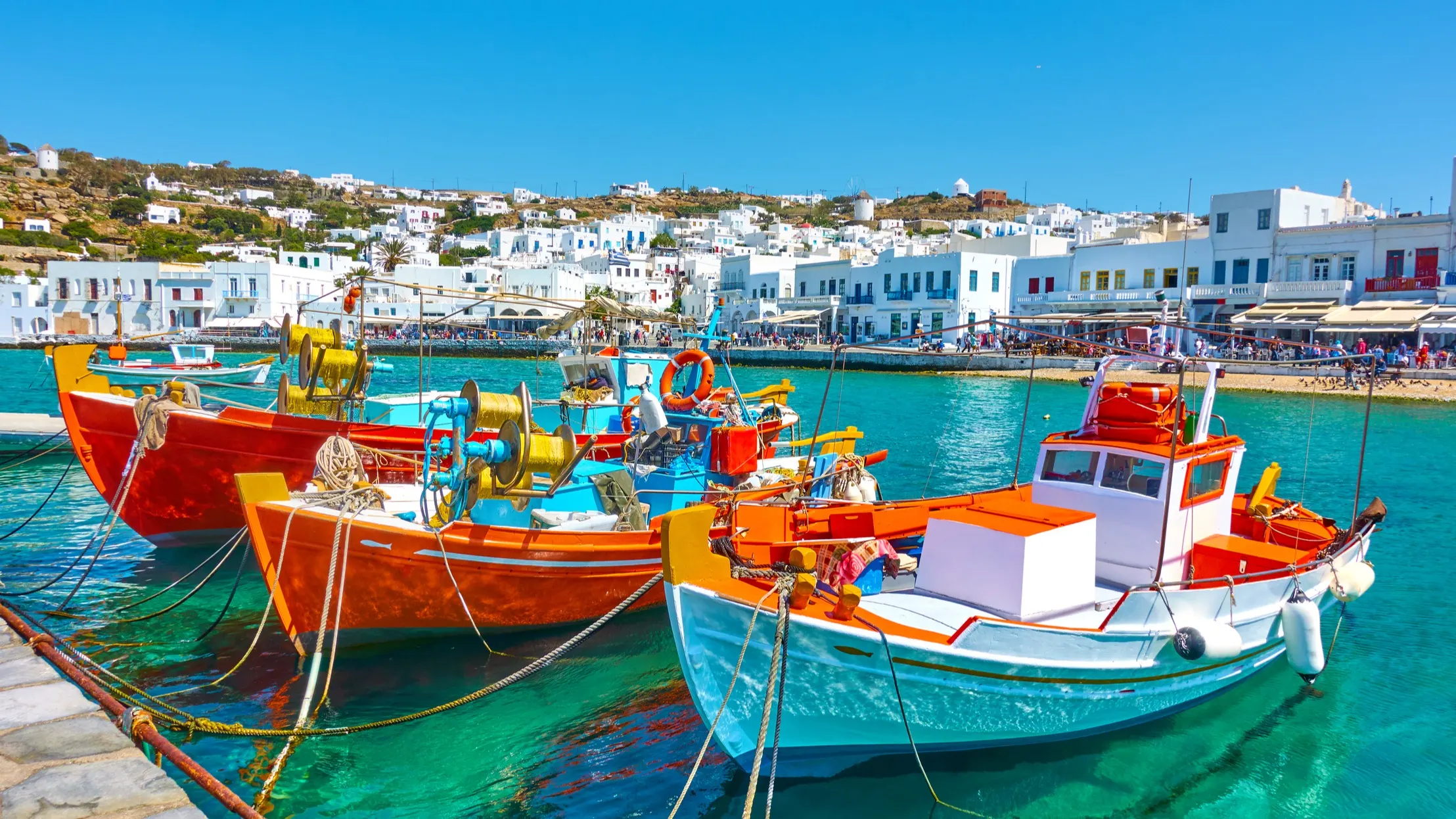
Mykonos is considered an expensive island, and unless you apply a lot of energy into finding low-cost options, you will likely pay more to live in Mykonos than in most other places in Greece. The average rent for a one-bedroom apartment in Mykonos Town is over $900 versus the Greek average of just under $400. In Mykonos, an inexpensive meal for two people averages about $18 and a mid-range meal for two averages about $92. For most things, you can assume the overall expense is at least 50% higher than the average expense in Greece. If cost savings is one of your main goals, Mykonos is not an obvious choice.
Is Mykonos Safe?
While Greece is generally a safe place to travel, crime in Mykonos can be an issue. Crimes of property, including car and home vandalism, as well as pickpocketing, are disappointingly high. The island gets crowded during the summer months, and this, coupled with the dramatic income divide between tourists and seasonal workers, creates a prime environment for theft. It is worth taking extra precautions to guard your valuables while in Mykonos.
And despite its fun-loving reputation, personal crime can also be an issue. The general rule is that it is safe to explore and walk around during the day, but as night falls, pay attention to your surroundings and be careful if you choose to explore on your own.
Things to See and Do in Mykonos
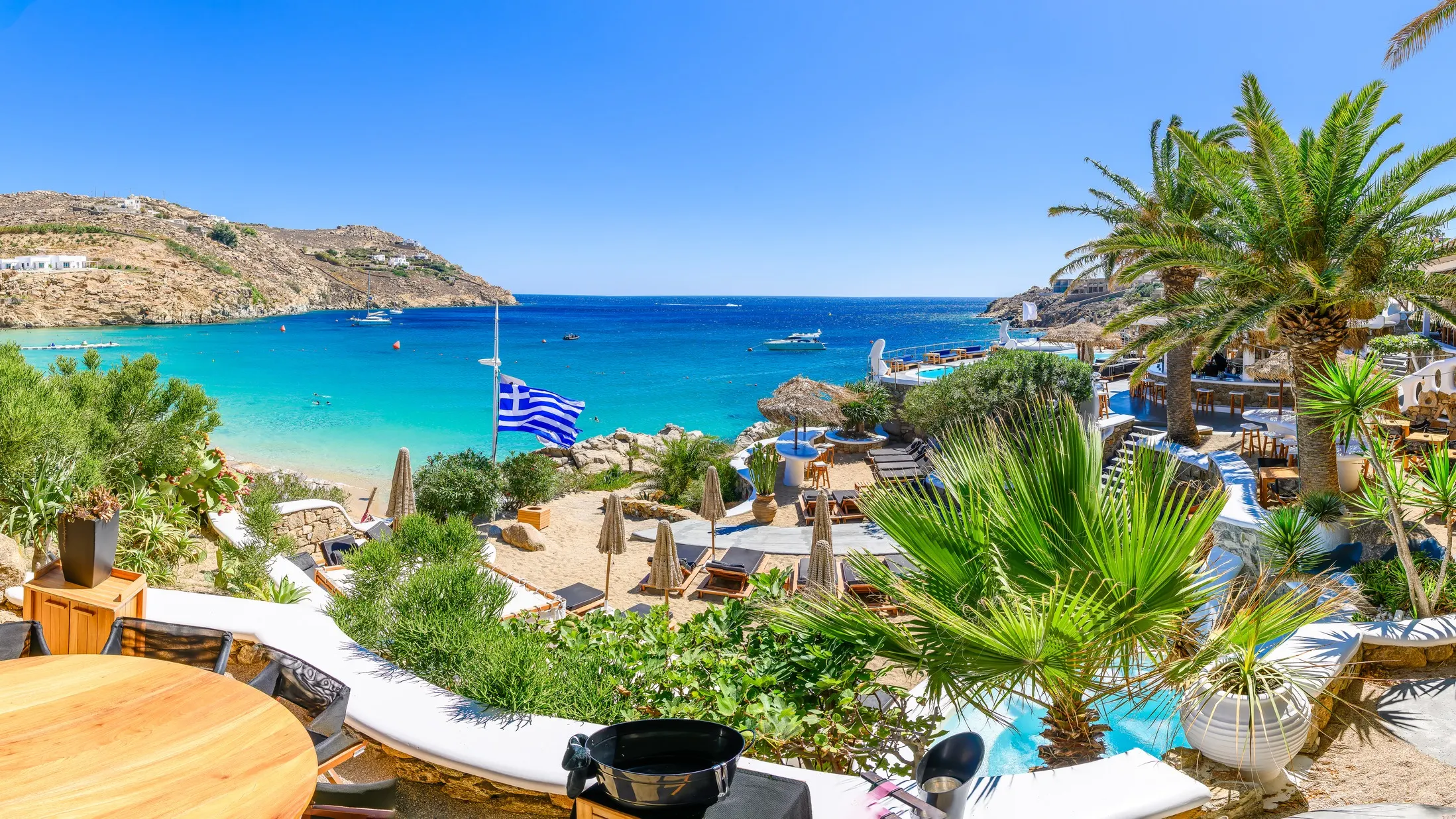
Despite its drawbacks, Mykonos is definitely worth a visit. I’ve had many fun adventures there, and I suspect you will too. Here are four things to see and do.
1) Visit World-Class Beaches
Mykonos is probably best known for its world-class beaches, and when it comes to the sea, the island doesn't disappoint. The most famous beaches are located in the southern part of Mykonos where the wind is less intense. Each beach has its own vibe and attracts its own crowd, so the trick to getting the most from your visit is to find the beach that matches your taste.
If you like a young, party-focused vibe, check out Paradise and Super Paradise, two of the most popular beach clubs for sunbathing during the day and dance parties at night.
For something more sophisticated and refined, try Scorpios for an upscale, laid-back vibe that combines creativity with exclusivity. Nearby you can drop into Santana Beach Club for a blend of pool party and sea.
If you are more of a free-spirit, try Elia Beach, a gorgeous spot where one side of the seafront is clothing optional. For sunset, head up the hill for drinks at the high-end Royal Myconian Hotel.
These are just a few of the dozens of beautiful beaches you’ll find in Mykonos.
2) Enjoy the Vibrant Nightlife
With a mix superstar DJs, party-hungry club kids, an anything-goes gay scene—and a tolerant full-time population—the island is known for its wild parties. You don’t have to stay up until 4:00 a.m. to taste the experience. Enjoy sunset drinks and a drag show at JackieO’s Beach Club. JackieO’s offers an inclusive joyful vibe and is a great way to end a day at the sea. Drop into Scorpio’s for some tribal beats in a stylish Burning Man’esque setting. This tastefully decorated beach club gives a high-end feel in a stunning setting. You can also dance the night away at Scarpa Bar in Little Venice in Mykonos Town. This tiny bar has a high energy fun vibe so drop in for a few music sets or make it the last stop on your Mykonos Town party tour. It is easy to have a good time in Mykonos.
3) Indulge Your Taste Buds
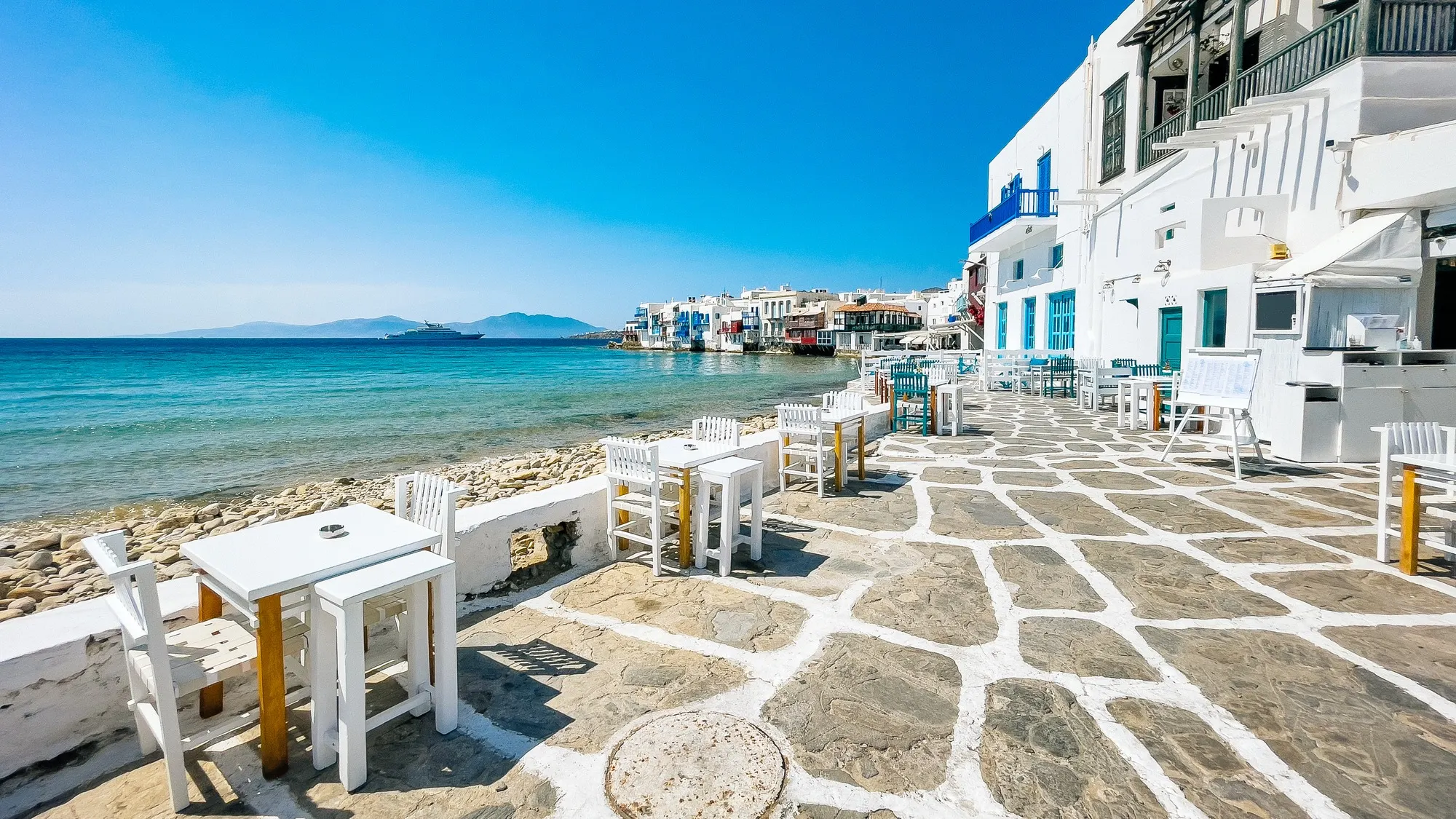
Mykonos is known for its mosaic of food choices, and from traditional Greek fish dishes to Japanese-inspired sharing plates and sushi, the island offers an international dining experience.
While Mykonos doesn’t have a Michelin-starred restaurant yet, the Mykonos Social located in the 5-star Santa Marina Hotel has formed a collaboration with Michelin-star chef Jason Atherton. Other noteworthy restaurants include Kiki’s Taverna, a taverna that runs without electricity and commands lines out the door for its fresh fish. If you want something more sophisticated, check out m-eating for a gourmet eating experience in Mykonos Town. If healthy eating is your goal, nice n easy is your place. This organic restaurant is situated right next to Little Venice, so go for a late lunch and head to Caprice Bar for sunset cocktails. And be sure to check out one of my personal favorites, Fokos Taverna, an off-the-beaten-path spot along the northwest coast. This authentic taverna gives you open access to a secluded beach, so you can catch your breath away from the regular Mykonos crush.
4) Explore the Sacred Island of Delos
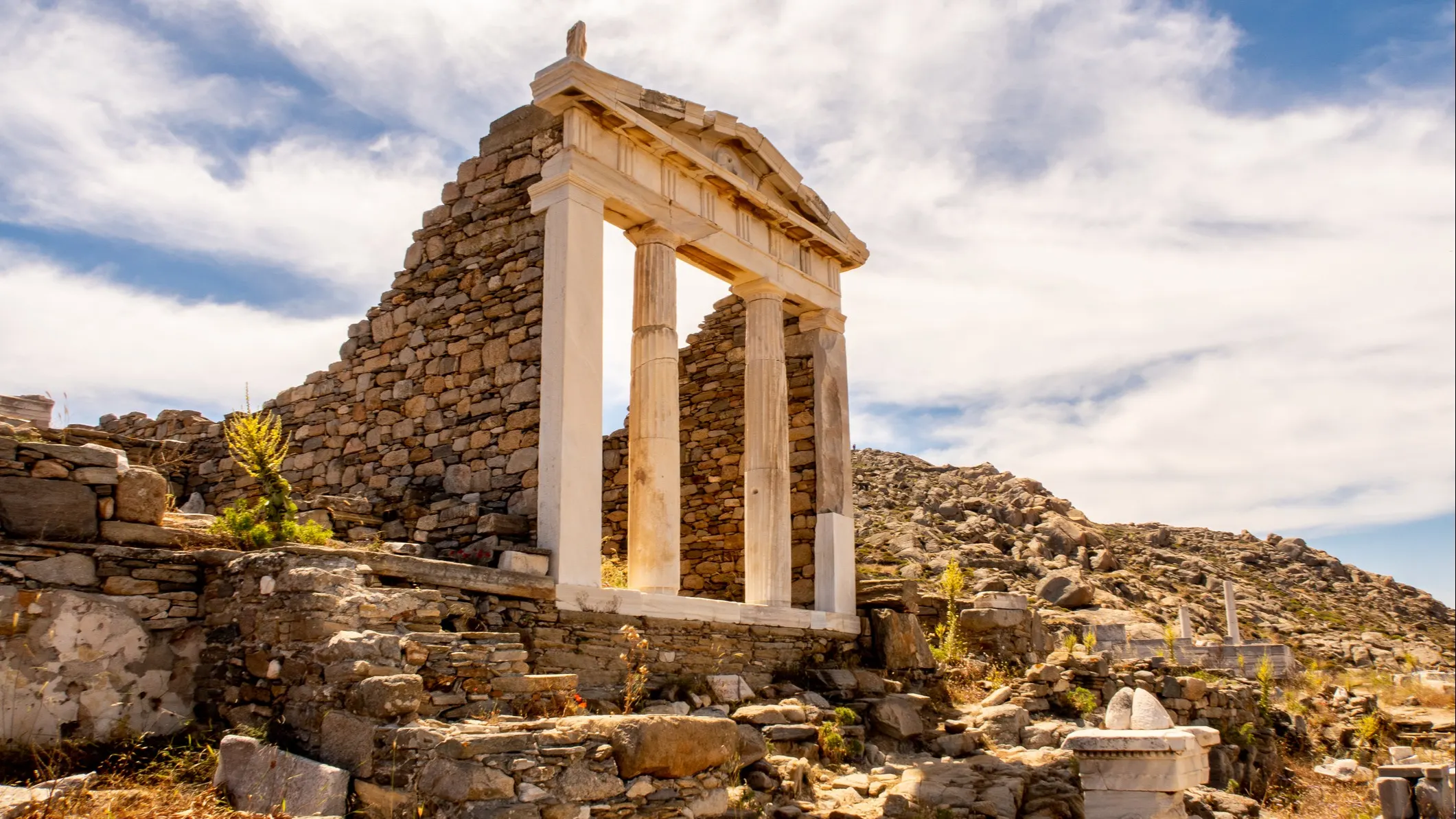
An easy 30-minute ferry ride from Mykonos lies Delos, one of the most important archeological sites in the world.
The island of Delos is thought to be the birthplace of Apollo, the god of light, and his sister Artemis, the goddess of the hunt. In ancient times, this island was so important it became the center of the Cyclades island complex and inspired the name “Cyclades” which translates to “those which encircle”. A tiny island with a total landmass of under 1.3 square miles, Delos became a religious destination and later a bustling port.
These days, the island offers a sacred site of ancient history. You can walk around the ruins including the Agora of Hermaists, the Temple of Delia, the Temple of Hera, the Minoa Fountain, the Avenue of the Lions, the Theater, and more. The island offers curated walking tours, or you can explore on your own.
In Summary
Mykonos has a personality and character all its own, and no two visits to Mykonos are the same. The island is an ever-changing kaleidoscope of expectations, possibilities, and dreams. If you go with an open mind and an adventure-seeking attitude, you’ll likely leave with stories to last a lifetime. But you don’t have to share the stories if you don’t want to because as the saying goes “what happens in Mykonos stays in Mykonos.”
Featured Image Copyright: ©iStock.com/Milena Pigdanowicz-Fidera
Get Your Free Greece Report Today!
Get Your Free Greece Report Today!
Learn more about a slower pace of life in Greece and other countries in our free daily postcard e-letter. Simply enter your email address below and we'll also send you a FREE REPORT — Retire in Greece—Find Your Dream Retirement in This European Archipelago.

By submitting your email address, you will receive a free subscription to IL Postcards, Overseas Dream Home, The Untourist Daily and special offers from International Living and our affiliates. You can unsubscribe at any time, and we encourage you to read more about our Privacy Policy.
